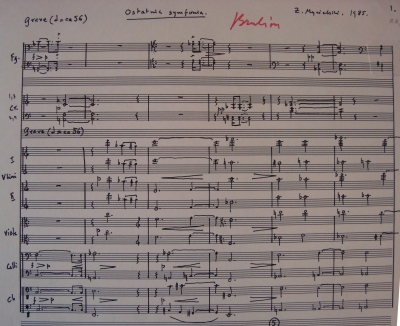![Last Symphony [Symphony No. 6] (1985–1986)](/upload/thumb/2022/11/1985_86_ostatnia-symfonia_auto_800x900.jpg)
Last Symphony [Symphony No. 6] (1985–1986)
instrumentation: 3 fl, 2 ob, cor ing, 2 cl B, 4 fg, cfg, 4 cor, 4 tr, 4 trbn, tb, gr c, cmp, ar, pfte, quintetto d’archi
dedication: –
duration: ???
manuscript: Zygmunt Mycielski Archive, Manuscript Department, National Library, no. V 14064 akc. 020455
Grave – Allegro – Lento – Poco piú mosso – Allegro – Lento – Vivace – Lento – Coda
Zygmunt Mycielski thought about his planned work on Symphony No. 6 already in 1984, informing Andrzej Panufnik of his intentions (letter of 29 December 1984, quoted after Zygmunt Mycielski – Andrzej Panufnik. Korespondencja, cz. 2: Lata 1970–1987, ed., introduction and comments Beata Bolesławska-Lewandowska, Institute of Art, Polish Academy of Sciences 2018, p. 212). He began composing in the Artists’ Retreat in Konstancin (March 1985) and continued it in Ojai, California, at the ranch of Mima Porter (sister of his friend from his student days in Paris, Marcelle de Manziarly). His progressive illness and hospitalisation contributed to the chaotic and nervous nature of the work on the score – in the end Mycielski was not satisfied with the effect achieved (the symphony breaks down into a series of agogically, expressively and texturally contrasted movements, and lacks a consistent musical narrative). And although initially the composer, encouraged by Jan Krenz’s sympathetic response, planned to give him the score, eventually, in October 1986, he wrote to Panufnik:
I have botched the LAST SYMPHONY. I won’t have it performed, unless I change it, correct it, but this is hard. It’s better to write something new. I’m angry with the LAST, I was in a hurry, I thought I was writing just FOR MY OWN PLEASURE, but they dragged me, one needs to justify the rest of one’s life somehow (letter of 8 October 1986, quoted after Zygmunt Mycielski – Andrzej Panufnik…, pp. 236–238).
Deposited at the National Library, the manuscript of the Last Symphony is full of pencilled corrections, additions and crossings-out. They testify to the composer’s attempts to polish his initial ideas, but Mycielski’s attention was at that time attracted by completely different texts and contents. He was about to start writing his last composition – Fragments for choir and small orchestra to words by Juliusz Słowacki.
